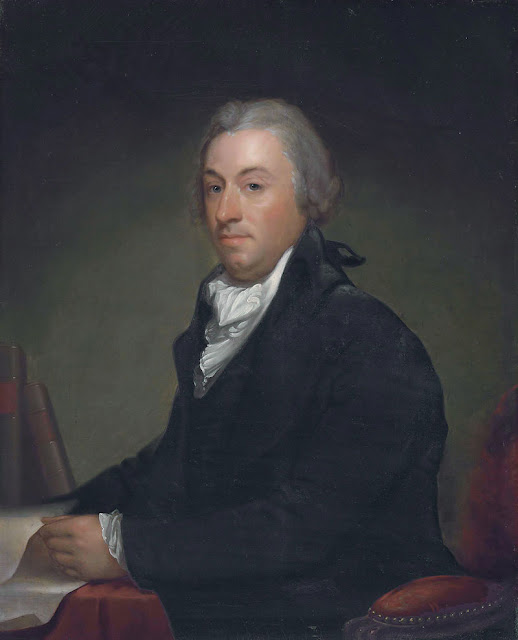 |
| Chancellor Robert R. Livingston |
Chancellor Robert R. Livingston was an ambitious man. He secured several prominent political
positions for himself, including Chancellor of New York and Secretary of Foreign Affairs under the
Articles of Confederation government. But he lusted for the positions that were just beyond his reach.
 |
| Not that George Clinton |
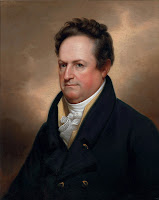 |
| De Witt Clinton |
He saw an opportunity in the 1798 New York gubernatorial election. It was not only the governorship of New York that he sought but the Democratic-Republican nomination for president in the 1800 election which would be easier to obtain as governor.<!–[if supportFields]>CITATION Geo601 \\p 274 \\l 1033 <![endif]–> (Dangerfield 1960, 274)<!–[if supportFields]><![endif]–>In 1798 Chancellor Livingston would face off against his former friend and Federalist John Jay, who had been serving as governor since 1795 having defeated George Clinton, the long serving first governor of the state, for the seat.
 |
| that\’s the one |
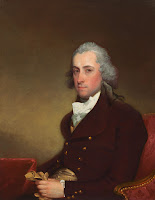 |
| Stephen Van Rensselaer |
On March 2, 1798 DeWitt Clinton wrote to Livingston to tell him he had been officially nominated for governor by the Democratic-Republican party. Interestingly enough their nominee for lieutenant governor was Stephan Van Rensselaer, the sitting lieutenant governor and also nominated again by the Federalist party for the seat. Livingston was disappointed by the choice the Democratic-Republicans had made in nominating Van Rensselaer as he viewed the man as a political enemy.
Even before the official nominations were in a hard election was predicted between the presumptive candidates. Thomas Jefferson wrote to James Monroe in December of 1797 to say he expected an extremely hard election between Livingston and Jay, who he thought was becoming unpopular in his own party.<!–[if supportFields]> CITATION Tho97 \\l 1033 <![endif]–> (T. Jefferson 1797)<!–[if supportFields]><![endif]–> In January 1798 Jefferson wrote to James Madison to repeat his theory of a hard election in New York.<!–[if supportFields]> CITATION Tho98 \\l 1033 <![endif]–> (T. Jefferson 1798)<!–[if supportFields]><![endif]–>
 |
| John Jay |
One of the most important issues of the brief campaign became loyalties and ties to other countries. John Jay was seen as an Anglophile because of his negotiation of the Jay Treaty in 1794. He had been sent to England to clear up several lingering issues after the Revolutionary War including trade issues and the impressment of American sailors by British ships. The final treaty granted the United States trading rights to Britain and the British West Indies and guaranteed that America would not join the neutral alliance forming in Europe as England and France went to war once more. The treaty did not address the impressment of British soldiers or enforce the removal of British posts they were supposed to abandon at the end of the Revolution but had not. These issues, left hanging, contributed to the start of the War of 1812. While most Federalists celebrated these closer ties with Britain and quickly pushed the treaty through congress, the Democratic Republicans denounced the treaty. Some Federalists did as well, including Chancellor Livingston. Its possible to draw a straight line from the treaty to his switching parties and the end of his friendship with Jay.
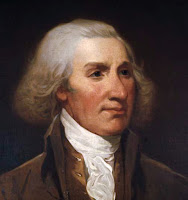 |
| Philip Schuyler |
Chancellor Livingston was seen as a Francophile. He had worked closely with French government officials during the Revolution and understood better than most that without France’s help victory over the British would have been impossible. In a letter to Alexander Hamilton, after a visit from the Chancellor, Philip Schuyler wrote that the Chancellor was even willing to forgive the current goings on in France to maintain the alliance with them.
In the same letter Schuyler wrote that the Chancellor and his friends were being “assiduous in Blackening Mr. Jay’s character.” Livingston claimed that Jay had given away too much in the Jay Treaty and would not only cause a rift with France but possibly make them subservient once again to Britain. Schuyler, a Federalist, chose not to believe a word of it.<!–[if supportFields]> CITATION Phi98 \\l 1033 <![endif]–> (Schuyler 1798)<!–[if supportFields]><![endif]–>
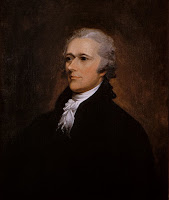 |
| Alexander Hamilton |
In April 1798 Alexander Hamilton, a leading Federalist wrote a screed against those who sided with France claiming that those who spoke against Britain only did so out of loyalty to France. He also suggested that it was only the “virtue” of the American peace negotiators in France at the end of the American Revolution that kept them from being under the thumb of the French as those who directed them, i.e. Chancellor Livingston in his role as Secretary for Foreign Affairs, would have wished.<!–[if supportFields]> CITATION Ale98 \\l 1033 <![endif]–> (Hamilton 1798)
Spreading word of the XYZ Affair also damaged Livingston’s chances of being elected governor. The scandal, which consisted of France demanding bribes and loans before they would begin negotiations with the United States over issues created by the Jay Treaty. The break down in negotiations would result in the Quasi-War with France beginning later that year. News of French the French demands turned more Americans, and New Yorkers, against the French and their Francophile allies in the United States.
In addition to the writings of the political elites the campaign was also fought in taverns and other public places. Broadsheets, maligning the character of the opponent, were printed by both sides. They were left where the common voter could read them or hear them read in the hopes of swaying votes one way or another.
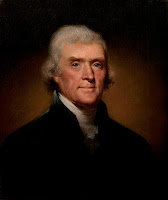 |
| Thomas Jefferson |
The election was held in April. Not on a specific day but spread out over several days to allow far flung counties to get their ballots to Albany. When the votes were counted Livingston had received 13,632 votes and Jay 16,012. Livingston’s ambitions were stifled, and Jay would continue as governor.
Livingston nursed his wounds for three years until Thomas Jefferson, who had received the Democratic-Republican nomination for president in 1800 that Livingston had yearned for, appointed him minister to France in 1801. Livingston began to rebuild his ambitions.
Works Cited
<!–[if supportFields]> BIBLIOGRAPHY <![endif]–>Dangerfield, George. 1960. Chancellor Robert R. Livingston of New York 1746-1813. New York: Harcourt, Brace and Company.
Hamilton, Alexander. 1798. \”A French Faction, [April 1798].\” Founders Online. April. Accessed April 6, 2021. https://founders.archives.gov/documents/Hamilton/01-21-02-0248.
Jefferson, Thomas. 1798. \”To James Madison from Thomas Jefferson, 3 January 1798.\” Founders Online. January 3. Accessed April 6, 2021. https://founders.archives.gov/documents/Madison/01-17-02-0050.
Jefferson, Thoms. 1797. \”From Thomas Jefferson to James Monroe, 27 December 1797.\” Founders Online. December 27. Accessed April 6, 2021. https://founders.archives.gov/documents/Jefferson/01-29-02-0478.
Schuyler, Philip. 1798. \”To Alexander Hamilton from Philip Schuyler, 31 March 1798.\” Founders Online. March 31. Accessed April 6, 2021. https://founders.archives.gov/documents/Hamilton/01-21-02-0227.
<!–[if supportFields]><![endif]–>